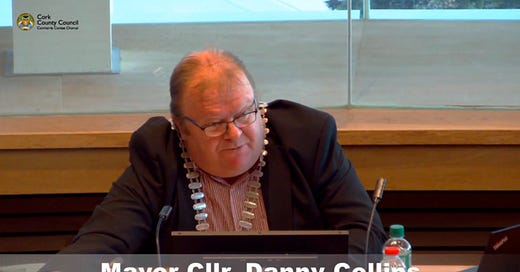Commercial rates increase as Cork County Council votes for record budget
There was little appetite from elected members for a 3.5% increase in rates for businesses, with many councillors pointing to the struggling high street in county towns and villages.
Rates for Cork county businesses are set to be increased by 3.5% for 2023 following lengthy debates at Cork County Council’s annual budget meeting on Monday.
Councillors voted 33-19 in favour of the €403 million budget.
The council executive had proposed an increase in rates for businesses of 3.5%, with all businesses paying over €2,000 in rates annually eligible for the hike. This would raise €2.1 million in additional revenue, Head of Finance Lorraine Lynch told the meeting.
However, only businesses that pay over €7,000 in rates per year will actually have to pay the increased commercial rate, after councillors proved reluctant to hit cash-strapped local businesses with any further increase in rates.
They voted for an amendment meaning that only larger businesses would pay the increase.
“From my own point of view, I can’t give this 3.5% increase to low rate payers,” County Mayor Cllr Danny Collins said. “They are small shops and businesses and they are struggling.”
Independent councillor Collins, who owns the Boston Bar in Bantry, said he knows people might perceive he has a conflict of interest as he is a publican himself, but increased energy bills, inflation and post-Covid uncertainties for local high streets meant that small businesses were struggling and that they should not be hit with additional charges, no matter how small. He proposed that all businesses paying under €10,000 in rates be eligible for a rebate. This was later amended to €7,000.
However, Fine Gael councillors refused to support the budget even with the amendment and voted against it.
“Fine Gael always supports small businesses which are crucial to our economy. We do not support this budget and won’t be voting for it.” Cllr John Paul O’Shea, acting as FG spokesman, told the meeting.
Threats of service cuts
This is the second time the council executive has clashed with elected representatives over increasing charges during the preparation of this budget.
Following a shock presentation in September, where the council executive warned of slashed public services including libraries, burial ground maintenance, litter clean-ups, maintenance of green spaces and public amenities like swimming pools if the Local Property Tax wasn’t increased, this week, a budget that would preserve these services was presented, depending on an increase in commercial rates.
Cork county councillors had voted to freeze Local Property Tax at 7.5% until 2024 in September’s council meeting, despite a recommendation from the council executive to increase it to 15%:
Record-breaking budget
This year’s record-breaking budget, which reflects energy price hikes, a council staff wage bill increase in line with pay agreements, inflation and a growing population and demand for services, is €31 million more than for 2022.
The county’s growth had put an “additional demand on services for what is an ambitious programme; while growth is welcome, it puts significant pressure on our revenue budgets,” Cork County Chief Executive Tim Lucey said.
Inflation, increased energy costs and the county’s growing population and corresponding need for services were a factor, but so was a €15.7 million council staff pay rise of 6-7%, in line with the national pay agreement.
The council wage bill is currently just under €162 million and will rise to €177.5 million in 2023. However, councillors for some Municipal Districts voiced concerns over the lack of outdoor staff for engaging in practical roles.
Council staff numbers approach 2,500
There were 2,271 council staff on the books in 2022, with an additional 148 staff being added in 2023, Mr Lucey told the council. 118 of these positions were fully funded by government.
What’s in the budget?
€79.5 million on housing for 2023, up from €70,614,000 in 2022, including an increase of €1 million for homeless services, to €5 million countywide.
€44.1 million on water services, up €4.5 million from €39,631,000 in 2022, including €1.3 million from the OPW for the “management of flood relief schemes.”
€94.8 million on roads, up €2 million over 2022.
€52 million on environmental services, up €4.7 million from last year and including €3 million for street cleaning.
Increased spends on library services, public toilets, litter control and front-line services were also included.
€1.273 billion in capital funding for a largely state-funded three-year rolling programme was also announced, a 27% increase over the 2021-2023 period.
This includes €333 million on social housing and €86 million on “affordable housing” as well as €484 million on “climate-related” measures including public lighting retrofitting and €94 million on active travel.
The council will spend €16 million on a “fleet upgrade” for its vehicles under the heading of climate-related measures.
100% rates refund for vacant businesses to continue
The 100% refund Cork County Council offers on vacant commercial buildings is set to continue for the next year, despite Green Party Councillors Alan O’Connor and Liam Quaide calling for the council to consider following in the footsteps of 19 other Irish local authorities and beginning to impose a surcharge to discourage business vacancy in towns.
Many local authorities have begun offering only a partial rates refund in the hopes that it creates a disincentive for business premises to remain vacant.
“If there was income accruing from it and if it encouraged people to bring vacant properties into use, might we look into that?” Cllr Alan O’Connor said. “What would a 10% charge on those vacant buildings bring in? I do respect the complexities though, and wonder if we could thoroughly assess it next year.”





